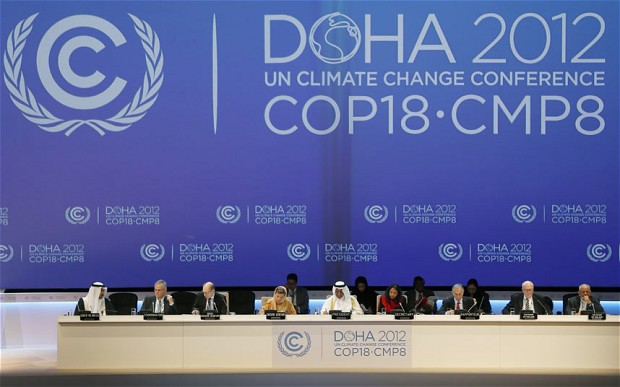 In my new book on negotiating, “The Yes Book”, now out on Random House, I describe some social and business trends which are changing the way that we negotiate and making it essential that we up our game as negotiators. I have split the last part of my blog series into three parts – all related to the environment – the first of the trends I will look at is climate change.
In my new book on negotiating, “The Yes Book”, now out on Random House, I describe some social and business trends which are changing the way that we negotiate and making it essential that we up our game as negotiators. I have split the last part of my blog series into three parts – all related to the environment – the first of the trends I will look at is climate change.
Successive climate change conferences have illustrated some stark choices for nations as to whether to collaborate with each other creatively, or negotiate selfishly over the impact of climate change in a more traditional and old fashioned way.
There seems to be little hope that global temperature rises can now be contained below 2 centigrade. The International Energy Agency in its World Energy Outlook predicts that 2017 will be the year when the world is “locked in” to a rise in global temperatures of at least 2 degrees Celsius. For the world to halt warming at that 2-degree level, it would need to ensure that all additional energy infrastructure was zero carbon or begin phasing-out existing infrastructure before the end of its useful economic life. That is not going to happen.
Experts clamour to warn us of the dire consequences of an increase in global temperatures of 4%. A 4 Centigrade rise in the planet’s temperature (currently predicted for around 50 years’ time) would see severe droughts across the world and millions of migrants seeking refuge as their food supplies collapse.
A series of “thresholds” could be crossed, including the permanent absence of summer ice in the Arctic, loss of most of the tropical coral reefs, disappearance of coastal wetlands, melting of the permafrost which would in turn give out yet more greenhouse gases and dieback of the Amazon forest.
So how is the world dealing with negotiating this minor problem?
 The 2012 UN Climate Conference at Doha at least agreed that there would be a new round of negotiations towards a new “protocol, another legal instrument or an agreed outcome with legal force”, to be concluded by 2015 and to take effect after 2020. At the same time the Kyoto protocol, which was thought by many to be on the verge of collapse, was kept alive until at least 2020. A further conference takes place in Poland in 2013, and the Paris Conference in 2015 (when the new treaty is supposed to be adopted) looks key.
The 2012 UN Climate Conference at Doha at least agreed that there would be a new round of negotiations towards a new “protocol, another legal instrument or an agreed outcome with legal force”, to be concluded by 2015 and to take effect after 2020. At the same time the Kyoto protocol, which was thought by many to be on the verge of collapse, was kept alive until at least 2020. A further conference takes place in Poland in 2013, and the Paris Conference in 2015 (when the new treaty is supposed to be adopted) looks key.
However, the process is one in which national short term selfishness consistently conflicts with the creation of meaningful outcomes which would benefit everybody.
Kumi Naidoo, Executive Director of Greenpeace International, expressed his disappointment at the outcome:
“Today we ask the politicians in Doha: Which planet are you on? Clearly not the planet where people are dying from storms, floods and droughts. The pace of progress is glacial. The inability of governments to find common ground to combat a common threat is inexplicable and unacceptable. It appears governments are putting national short term interest ahead of long term global survival.”
Dr. Fred Boltz, Senior Vice President for International Policy at Conservation International, added:
“At most, what this meeting has achieved is an agreement to continue negotiating next year. Countries continue to put their ‘national priorities’ first, forgetting that we have a common interest. They are playing a game of chicken that risks sending all of us over the cliff.”
The US (the world’s second largest emitter) refused to sign up to Kyoto. But US emissions are at least in decline. However, at the heart of the problem are developing nations like China and India. China is the world’s largest emitter, contributing nearly a quarter of current global emissions. With India it accounted for 83% of the worldwide increase in carbon emissions in 2000-11.
Though global warming began with industrialised countries the focus now is particularly on actions in developing ones. But developing nations don’t see why they should be prevented from enjoying the fruits of rapid industrialisation in the same way that the developed world has already done. This is despite the fact that global warming will affect developing countries more than rich ones, partly because tropical and subtropical lands are more sensitive to warming than cold or temperate ones, and partly because wealthy countries can afford better flood controls and drought-resistant seeds than poor ones. One estimate by William Cline, an economist, found that a rise of 2.5% in global temperatures would cut agricultural productivity by 6% in America but by 38% in India.
 Negotiations have also effectively come to a halt on financial assistance to developing countries, both for adaptation to the effects of climate change, and to help them reduce their emissions. In a previous climate-change round in Copenhagen, developed countries committed to providing $100bn by 2020. But there is no agreement over how much of this must be public finance and how much can be private; and whether the public money will be on top of existing aid commitments. Moreover in the present economic climate the likelihood is that short term assistance levels will fall, which will increase anger among developing countries and result in further accusations of broken promises.
Negotiations have also effectively come to a halt on financial assistance to developing countries, both for adaptation to the effects of climate change, and to help them reduce their emissions. In a previous climate-change round in Copenhagen, developed countries committed to providing $100bn by 2020. But there is no agreement over how much of this must be public finance and how much can be private; and whether the public money will be on top of existing aid commitments. Moreover in the present economic climate the likelihood is that short term assistance levels will fall, which will increase anger among developing countries and result in further accusations of broken promises.
On technology transfer, the objective of developing countries has always been the free or cut-price transfer of low-carbon technologies from developed countries, including the intellectual property rights which would allow domestic manufacture. But this has always been rejected by developed countries, who want to protect their trading advantages.
The seemingly inexorable drift to irreversible climate change can only be addressed by co-operative negotiating in which countries are prepared to put the welfare of the planet ahead of their short term national interests – or find a way for the two goals to be aligned.
Comments entrepreneur Richard Branson;
“The fight against greenhouse gases offers huge opportunities for profit. In order to promote this idea, some friends and I have founded the Carbon War Room. We think that one way to look at climate protection is to regard it as a business model, because our only option to stop climate change is for industry to make money from it.”
This would be one way in which collaborative negotiation could make a huge difference in the battle to arrest global warming. Treating negotiation the old-fashioned way, as a competition which must be won, is going to make all of us losers.
I continue this theme in my next blog, on a related aspect of climate change – resource shortages.

